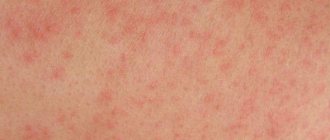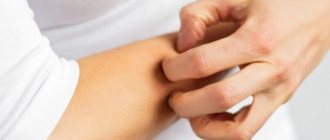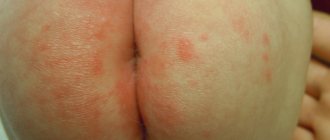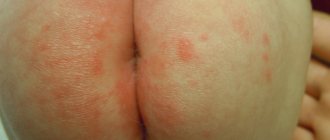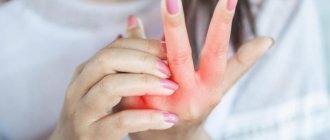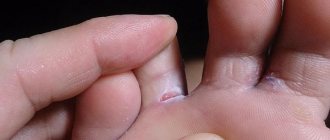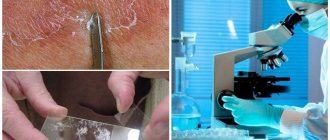Itching is not a separate disease; it is a symptom that accompanies many diseases of the skin and internal organs. Only finding the true cause of itching will allow you to take the right preventive and therapeutic measures. Itching can be constant throughout the day, or it can only occur at night. This is especially annoying and stressful, it does not allow you to sleep peacefully and gain strength for a new day. As a result, attention and memory are dulled, performance and quality of life in general deteriorate significantly. This often leads to a breakdown of mental balance, emotional breakdowns, the development of apathy and severe depression.
Body itching at night can vary in intensity. It manifests itself in the form of short-term acute attacks or worries continuously almost the entire time a person is in bed. Prolonged, chronic itching is the most debilitating. Unpleasant sensations at night may disappear for some time, and then appear again. In addition, in one case, a certain anatomical area itches (localized itching), in the other, almost the entire surface of the body (generalized itching).
Sometimes a person, under the influence of itching, scratches his body at night, without waking up completely and mechanically making every effort to scratch. As a result of such actions, abrasions and dangerous wounds can form, favorable for the penetration of bacterial infections. Mechanical impact on itchy areas can lead to serious cosmetic defects.
Causes of itching at night
Among the factors that can cause itching sensations that worsen at night, the most common are:
- scabies;
- insect bites;
- allergy;
- skin diseases;
- dry skin;
- psychological factors;
- diseases of internal organs;
- insect bites.
Let's look at each reason in more detail.
Scabies
When it comes to regular or constant itching that gets worse at night, the first thing to rule out is scabies, since this disease is contagious.
The intensity and increase in discomfort is associated with the activation of parasites that cause scabies, namely the scabies mite. Initially, when affected by mites, no rashes are visible on the skin; they appear later, since the incubation period takes about 6 weeks.
Insect bites and parasite activity
Mosquitoes and other blood-sucking creatures cause the formation of papules on the surface of the skin, which begin to itch unbearably almost immediately after the bite.
This effect is associated with the entry into tissues of saliva, which contains a number of irritating components or even poisons and toxins. Mosquitoes, bedbugs and fleas are most active at night, so increased itching at this time is not surprising. The bite sites are clearly visible on the skin; most often, insects attack those areas of the skin that were not covered during sleep.
In addition to insects, night sleep is disrupted by parasites that live in the intestines. It is at night that they come out to lay eggs in the folds of the anus. This process causes severe itching around the anus.
Allergic manifestations
Perhaps this is the most common reason that the skin itches intensely in various places at night.
The symptom occurs upon contact with an irritant. The allergen may be present in tissues that come into contact with the skin (clothing, bedding). In addition, a similar reaction can be caused by washing powder that is poorly rinsed during washing. In addition, itching may appear after water procedures carried out immediately before bed if detergents (shower gel, hair shampoo, toilet soap) containing components that irritate the skin were used.
Of course, the same remedies are used in the morning, but during this period the symptoms are less pronounced and there are much more distractions. In the evening, the friction of the skin on clothes and bedding increases when a person tries to sleep, and the slightest discomfort will not go unnoticed.
Skin diseases
Dermatoses of various etiologies (including herpes zoster or psoriatic rashes) are often accompanied by itching; the skin itches especially severely at night and in the evenings.
Xerosis
When the muscles located in the blood vessels of the skin relax, the itching intensifies, caused by excessive dryness of the skin. It can be caused by seasonal cold snaps, high bath water temperatures, aggressive detergents, or exposure to direct sunlight.
Psychological factors
During periods of severe stress and emotional overstrain, as well as due to disorders and disturbances in the functionality of the nervous system, itching may occur, which has a psychogenic etiology. During the daytime, skin irritation is minor, but in the evening attacks of scratching become worse due to increased skin contact with clothing and bedding and the lack of distractions.
Diseases of internal organs
The next set of factors that can cause the body to itch at night are diseases of various organs. More often than others, this symptom manifests itself when a malfunction of the endocrine system occurs. Thyroid dysfunction is accompanied by discomfort and itching, which affects the entire body and intensifies at night.
Another insidious disease that causes an unpleasant symptom is diabetes mellitus of the first and second types. Moreover, this manifestation usually precedes all other specific signs characteristic of diabetes.
This condition can be caused by liver dysfunction, in particular jaundice. The fact is that with this disease, bilirubin accumulates in the skin - a specific pigment that irritates nerve endings and leads to itching sensations that are not accompanied by visible rashes.
The variety of causes of night itching necessitates an examination to determine the etiology of the pathological condition.
Why do Itchy people dream // O. Smurova’s dream book
What does the dream about Itching mean?
Itching - If you dreamed that you were itching, then this means that you will soon find yourself in a difficult situation.
But if in a dream you are itching in the same place, then this indicates that you must be patient if you want your plans to come true.
Scratching your head in a dream is a sign of disorder in life. The dream indicates that you need to behave more carefully to avoid losses.
See also: why do you dream about lice, why do you dream about fleas.
Causes of itchy body skin
To get rid of discomfort, it is necessary to find out why it arose. There are many reasons for itchy body skin. It is caused by skin diseases, problems with internal organs, or even a certain emotional state. Regardless of why the skin of the body itches, this condition must be eliminated. It is worth taking a closer look at the most common factors that provoke it.
Causes of itching all over the body without rashes
A very common occurrence. The following causes of itching all over the body without rashes may be noted:
- chronic renal failure;
- old age (as we get older, the skin becomes drier, so itching may occur);
- development of liver diseases;
- pregnancy;
- mental disorders;
- pancreatic head cancer;
- blood diseases;
- blocking of the duodenal opening by a neoplasm;
- infectious invasions;
- diabetes mellitus and thyroid disorders (very common causes of itchy body skin without a rash);
- stress;
- a side effect of taking a drug.
Causes of severe itching all over the body
Sometimes the irritation is simply unbearable. The causes of severe itching all over the body are:
- allergies (usually atopic dermatitis, urticaria);
- stress (the degree of irritation varies from mild and unnoticeable to very strong, causing uncontrolled scratching of the skin);
- seasonal weakening of the body (especially in people with vegetative-vascular dystonia);
- lymphogranulomatosis;
- kidney disease;
- Hodgkin's lymphoma;
- multiple sclerosis;
- erythremia.
Rash and itching on the body in an adult
The most common, but far from the only cause of such symptoms is allergies. In general, the factors that provoke rash and itching on the body in an adult are divided into infectious and non-infectious. Each group requires detailed consideration. Infectious causes of skin itching with rash:
- Syphilis. In the second stage of the disease, the body becomes covered with spots, and in the third - a small rash similar to a nettle lesion. The route of transmission is sexual.
- Lichen. Absolutely all types of rashes are characteristic of such skin lesions. Always accompanied by itching and irritation.
- Herpes. It most often appears on the face, but can also be located in other areas. It starts with a spot of redness that you want to scratch unbearably, then in its place small bubbles with water inside appear, then crusts.
- Rubrophytia. A fungus that affects the feet.
- Pemphigus.
Non-infectious reasons why the skin on the body itches and a rash occurs:
- lupus erythematosus or systemic lupus;
- seborrheic dermatitis (affects areas of the body where there are many sebaceous glands);
- hives;
- psoriasis (at first the rash does not itch, but later leads to severe discomfort);
- Diaper rash.
Subcutaneous itching
This phenomenon does not occur as often as others, but it causes a lot of inconvenience for both adults and children. Subcutaneous itching begins due to:
- allergic reactions;
- mental disorders;
- neurodermatitis (this disease is caused by stress);
- problems with the digestive system;
- fungi;
- parasitic infestations.
Causes of dry and itchy body skin
These two states are closely interrelated. The main causes of dry and itchy body skin are aging and dehydration. The cells gradually become less elastic than before. In addition, dry itchy skin occurs when:
Treating itchy skin that occurs at night
The rationality of treating skin irritation will be if you begin to treat the main reason for which itching occurs on the body.
When itching occurs as a result of an allergy, it is important to avoid contact with the allergen and start using antihistamines (Suprastin, Erius, etc.). If the reason lies in a malfunction of the internal organs, you should visit specific specialists to choose the right treatment
If you have diabetes, you need to start taking medications that lower blood sugar levels as soon as possible. This is necessary to ensure that the disease does not progress rapidly and lead to undesirable consequences.
If the reason lies in a malfunction of the internal organs, you should visit specific specialists to choose the right treatment. If you have diabetes, you need to start taking medications that lower blood sugar levels as soon as possible. This is necessary so that the disease does not progress quickly and lead to undesirable consequences.
Skin parasites can be gotten rid of with the help of medications, as well as disinfection of bed linen and clothing.
Traditional ways to relieve itching
You can relieve the symptoms of itching yourself at home:
- Soda paste. The remedy is effective especially after mosquito bites and allergies. It prepares very quickly, you just need to dissolve a little baking soda in boiled water. Apply to the itchy area of skin and leave for 30 minutes. Symptom relief occurs after 5 minutes and the effect lasts up to 6 hours.
- Medicines based on table vinegar. It is enough to take 30 ml of water and pour 1 tbsp into it. l. vinegar. It is necessary to moisten a piece of cloth and apply it to the irritated area, after 10 minutes the itching stops.
- For severe itching, you can take boric acid and add it to a tea decoction with alcohol. The product is a little more difficult to prepare, but can be used for all types of itching.
- A good option would be to use fresh dill. You just need to crush the dill to the consistency of porridge and apply it to the affected area of the skin. Twenty minutes is enough to relieve discomfort.
- Aloe vera leaves. In addition to relieving itching, the plant is good at relieving inflammation and possible suppuration during scratching. The cut leaves are soaked in cold water, cut and applied to the itching area. You can repeat the procedure several times.
Application experience
Under our supervision there were 75 patients aged from 18 to 76 years (34 men and 41 women) with diagnoses of “atopic dermatitis”, “allergic dermatitis”, “chronic eczema in the acute stage”, “lichen planus”, “toxidermia” ( Fig. 2).
Rice. 2. Distribution of patients by nosology
All patients received topical and systemic therapy, including the antihistamine Cetrin (cetirizine) at a dose of 10 mg once a day at night. The duration of therapy is from 14 to 21 days, depending on the diagnosis. Patients assessed the effectiveness of itching relief using a point system: 0 points - no itching, 1 point - mild itching (present, but not bothersome), 2 points - moderate (bothering, but does not interfere with daily activity and/or sleep), 3 points - severe /intense itching (disturbs and interferes with daily activity and/or sleep).
The maximum reduction in itching intensity was observed within 3 hours of taking the drug in the first five days (Fig. 3).
Rice. 3. Average subjective assessment of the intensity of itching after using the drug
Subsequently, a decrease in itching or its absence was noted by the 10th day of therapy, with a simultaneous decrease in the clinical manifestations of the disease (Fig. 4).
Rice. 4. Dynamics of clinical manifestations
The results obtained demonstrate the high effectiveness of Cetrin (cetirizine) in the treatment of chronic and acute dermatoses. Cetrin (cetirizine) has a pronounced antipruritic effect, and also reduces other clinical manifestations of allergic dermatoses (infiltration, erythema). In addition, the drug can also be used for somatic diseases as symptomatic therapy.
Bibliography:
- Duncan WC, Fenske NA Cutaneous signs of internal disease in the elderly // Geriatrics. 1990. Vol. 45. No. 8. P. 24-30.
- Masmoudi A., Hajjaji Darouiche M., Ben Salah H. et al. Cutaneous abnormalities in patients with end stage renal failure on chronic hemodialysis. A study of 458 patients // J. Dermatol. Case Rep. 2014. Vol. 8. No. 4. P. 86-94.
- Abel EA, Farber EM Malignant cutaneous tumors // Scientific American Medicine / eds. E. Rubenstein, D. D. Federman. Section XII. New York: Scientific American, Inc., 1992. P. 1-20.
- Dangel RB Pruritus and cancer // Oncol. Nurs. Forum. 1986. Vol. 13. No. 1. P. 17-21.
- Bernhard JD Clinical aspects of pruritus // Dermatology in General Medicine / eds. T.B. Fitzpatrick, A.Z. Eisen, K. Wolff et al. 3rd ed. Chapter 7. New York: McGraw-Hill, 1987. P. 78-90.
- Smirnova G.I. Antihistamines in the treatment of allergic diseases in children. M., 2004.
- Gushchin I.S. Cetirizine is a standard H1-antihistamine // Mistetstvo Likuvannya. 2009. No. 5. P. 60-70.
- Belsito D. Second-generation antihistamines for the treatment of chronic idiopathic urticaria // J. Drugs Dermatol. 2010. Vol. 9. No. 5. P. 503-512.
- Grant J., Riethuisen J., Moulaert B., DeVos C. A double-blind, randomized, single-dose, crossover comparison of levocetirizine with ebastine, fexofenadine, loratadine, mizolastine, and placebo: suppression of histamine-induced wheal-and -flare response during 24 hours in healthy male subjects // Ann. Allergy Asthma Immunol. 2002. Vol. 88. No. 2. P. 190-197.
- Kavosh E., Khan D. Second-generation H1-antihistamines in chronic urticaria: an evidence-based review // Am. J. Clin. Dermatol. 2011. Vol. 12. No. 6. P. 361-376.
- Volosovets A.P., Krivopustov S.P., Pavlik E.V. The role of allergic inflammation in everyday medical practice. Optimization of antiallergic therapy // Medical literature (Kyiv). 2010. No. 1. P. 70-75.
- Nekrasova E.E., Ponomareva A.V., Fedoskova T.G. Rational pharmacotherapy of chronic urticaria // Russian Allergological Journal. 2013. No. 6. P. 69-74.
Senile itching in the back
When old age comes, people begin to experience various ailments associated with the aging process. They often complain of constant itching in the back. Itchy shoulders and shoulder blades, spine, sides and lower back. The itching can be in one place or another, or it can immediately cover the entire back and spread to the body. The sensations are annoying and intensifying; it is impossible to get rid of them by simply scratching.
This signal should not be ignored under any circumstances, and although it occurs as a consequence of age-related changes, and the signs are harmless, it can indicate a serious pathology of the systems.
The main differences between senile itching and other diseases
In old age, the skin on the back itches for the following reasons:
- Parasitic microorganisms.
- Manifestation of allergies.
- Disturbances in nerve structures.
- Pathologies of metabolic processes.
- Other pathologies.
- Tumors.
- Actually, age-related problems bring changes.
Physiology of senile itching
First of all, this phenomenon is characterized by the fact that, despite the method of its occurrence, it is aggravated by the loss of moisture from the skin layer, which accompanies the aging process of the body and skin, among other things.
Manifestation of xerosis on the hands
Why does older people have dry and itchy skin?
As we age, skin cells, like all tissues and organs, gradually atrophy. Because of these processes, the skin begins to dry out, due to the body’s inability to fully moisturize it.
The sebaceous glands also atrophy, their activity decreases significantly, which contributes to dryness and aggravates discomfort.
Elderly itching can be caused by abnormalities in the functioning of the immune system. Since protective capabilities decrease with age, the risk of becoming infected with subcutaneous mites increases significantly. Also, in older people, the likelihood of neuralgic diseases increases. As a result, the back and the whole body begin to itch in a state of stress or emotional distress.
Signs and symptoms of demodicosis
In some episodes of senile itching, its nature, despite numerous examinations, cannot be diagnosed. Doctors examine the patient’s skin, conduct examinations of internal organs, test the functioning of systems, do tests, check the central nervous system and the functionality of the digestive system, trying to identify the cause. But sometimes the itching stops only after taking medications that eliminate the feeling of discomfort.
Itching - Dream Interpretation 1918
Why do you dream about scratching?
If you dreamed that you were afraid of contracting scabies, then you are afraid of failing in an important matter. And in vain, you will succeed in your undertaking.
A dream in which you are tormented by scabies predicts that you will resist harsh external pressure.
If a young woman dreams of scabies, then she may fall into bad company.
In general, any scratching in a dream portends trouble for you.
Causes
If the causes of itching cannot be determined visually, then it is called “itching of unknown etiology” and we begin to determine one of the possible provoking factors:
The patient has increased sensitivity. This phenomenon is observed in the case of:
- neurasthenia;
- states of hysteria;
- as a consequence of previous infectious and colds;
- for mental illness and stress.
- The man is simply too suspicious. He may just think or remember something that, in his opinion, may be causing symptoms of itching (fleas, previous illnesses, allergies) - and immediately begin to itch.
- There was contact with real irritants - plants, insects, household chemicals, rough synthetics, etc.
- An itchy patient was faced with the impact of internal irritants on the body. This is the so-called toxic itch. This happens with pathologies of the gastrointestinal tract, especially the liver and bile ducts, diseases of the blood and endocrine system, obesity and hyperhidrosis.
- It is impossible not to mention the so-called “pregnancy itch”. During pregnancy, the female body undergoes significant restructuring, as a result of which, due to changes in the properties of the vaginal mucosa, a suitable environment for the proliferation of bacteria and fungi is created for some time.
Pregnant women quite often experience body itching, which is called “pregnancy itch.”
The most common diseases in which the phenomenon of skin itching is observed are:
- Neurodermatitis is a multifactorial disease of a chronic nature, most often caused by so-called neurogenic-allergic factors and manifests itself in the form of specific skin rashes. This pathological condition develops as a result of disturbances in the functioning of two systems - the immune and nervous, as well as allergic diseases (atopic dermatitis) and hereditary predisposition.
- Hives. Pale pink itchy papules with this allergic disease appear quite quickly and also disappear in just a few hours.
- Increased dryness of the skin (xerosis). Develops as a result of exposure to frequently used detergents, sun and during the natural aging process. The amount of sebaceous gland secretions decreases, which causes skin irritation, and as a result, the skin is constantly itchy.
- In diabetes, the level of glucose in the blood increases, which in turn leads to severe itching. There is no rash. Typically, the body of patients suffering from this disease is dehydrated, and this in itself is a very good reason for the development of itching of the skin. In some cases, dry skin is complicated by fungal infection and cracks.
- Scabies is caused by scabies, the itching with this disease is intense and mainly manifests itself at night.
With urticaria, small reddish papules appear on the body, which itch and soon disappear
Prevention
In order to avoid itching before going to bed, you should follow the rules of personal hygiene and partially or completely avoid consuming foods at night that can cause vasodilation: spices, alcohol, hot tea, hot food and coffee. In addition, it is necessary, if possible, to exclude from everyday life situations that lead to stress, overwork, anxiety and constant bad mood. Because these factors also lead to itching.
And most importantly, do not neglect annual preventive medical examinations, as these activities help to identify diseases in the initial stages.
When it's all about the skin
Itching affects the skin directly, and often the causes lie there. The sign signals the following dermatological diseases and disorders:
- Scabies is a contagious dermatological disease caused by parasites – scabies mites. Pathogens feed on particles of the dermis, move through its layers, “swarming” passages, and secrete waste products that have irritating and toxic effects on the skin. Ticks are active in the dark, which causes symptoms to intensify in the evening before bedtime and at night. Characteristic signs: severe itching, rashes, whitish lines on the body, crusts, peeling.
- Xerosis is increased dryness of the skin. This is not an independent disease, but a symptom caused by vitamin deficiency, improper skin care, exposure to adverse factors, and dermatological diseases. The situation is aggravated by temperature changes (especially cold weather), aggressive detergents and hygiene products, synthetic bedding and clothing, taking a hot bath or shower, and exposure to ultraviolet radiation.
- Psoriasis is a hereditary dermatological disease that manifests itself in the form of itching, localized skin rashes, and peeling.
- Dermatitis is an inflammatory lesion of the epidermis caused by damaging factors.
- Eczema is an inflammatory non-contagious disease accompanied by a recurrent rash, burning, peeling, and itching.
- Ringworm can develop in both children and adults. This is a group of contagious dermatological diseases caused by fungi, bacteria or viruses. With lichen, the skin itches severely day and night, rashes, peeling, and sometimes ulcers, crusts and blisters appear.
- Seborrhea is a pathological condition accompanied by an increase or decrease in the activity of the sebaceous glands. Symptoms often affect the scalp, causing dandruff, flaking of the skin, itching, and hair loss. At night, increased manifestations are caused by contact with bed linen and active friction against it.


